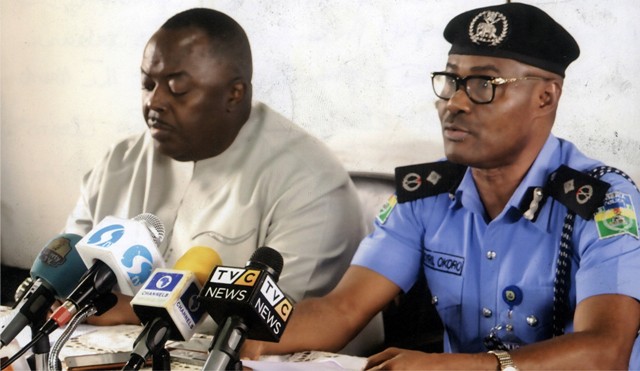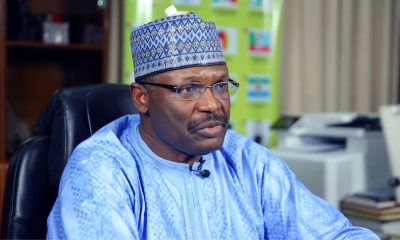Featured
Probe DSS’ Claim On Herdsmen’s Arms …Middle Belt, Southern Leaders Tell Buhari

Southern and Middle Belt Leaders Forum have called on President Muhammadu Buhari-led Federal Government to institute a probe into the statement made by the Director-General, Department of State Services (DSS). Lawal Musa Daura, that most of the sophisticated weapons being used by herdsmen were from the armouries of security agencies in the country.
The forum led by Chief Edwin K. Clark for South-South delegation, Chief Ayo Adebanjo (South-West), Chief John Nwodo (South-East) and Dr Bala Takaya (Middle Belt) made the call at a high-powered meeting it held at the weekend in Abuja, saying such occurrence if not properly investigated and addressed had serious implications for the country’s national security.
Daura had reportedly made the shocking revelation at the Senate Security meeting investigating the herdsmen/farmers clashes which had occasioned several deaths in the country, with several others injured while properties worth billions of naira were destroyed.
The leaders, who met to review the Benue crisis and other flashpoints in Nigeria, expressing disappointment that President Buhari had not lived up to the expectations of his office by keeping mute on the killings and visiting neighbouring Nasarawa and Adamawa States while ignoring Benue, equally demanded immediate rejig of the country’s security architecture to reflect the principle of Federal Character.
According to the Forum, which said it was disturbed by the allegation that soldiers drafted to Benue under “Operation Cat Dance” were circulating leaflets calling Tivs cattle rustlers which clearly suggested that the operation was ostensibly meant to turn victims into villains and decimate their capacity for self-defense, the current template where 16 out of the 17 security chiefs are from a section of the country is not healthy for a multi-ethnic state and, therefore, violates the principle of Federal Character.
The leaders, while also expressing disappointment with the poor state of affairs at the IDP Camps in Benue compared to other IDP camps around the country, urged President Buhari to immediately stop the killings going on in Benue and other parts of the country.
They said he should do this by disarming all armed herdsmen carrying illegal weapons and fish out culprits of killings in Benue and other places for prosecution.
This was just as they warned against any plot to declare a State-of-Emergency in Benue State as being canvassed by some sponsored group, recalling that such a move in the Western Region had dire consequences in the past.
On the issue of underage voters as cited in Kano during the recent Local Government polls in the state, the Southern and Middle Belt Leaders Forum said it was alarmed by what it described as the perverse culture as happened in the recent exercise in the state, describing the development as open rape on democracy.
According to the Forum, the unwholesome development is a carryover of the 2015 elections practice and a clear erosion of confidence in the electoral umpire, the Independent National Electoral Commission (INEC) to conduct credible elections.
The Forum, while rejecting INEC’s move to probe the incident as that would amount to cover-up, demanded that a Judicial probe of the voters registry be done by a panel to be headed by a retired Supreme Court Justice with members drawn from the Commission, registered political parties, Civil Society Groups and the National Democratic Institute for international representation.
It, however, said the enquiry should be done before further elections are held in the country with the current INEC register.
“Meeting was alarmed by the perverse culture of underage voters which was palpable in the recent Local Government elections in Kano. This open rape of democracy is a carryover of the 2015 elections practice and a clear erosion of confidence in the INEC to conduct credible elections.
“Meeting rejects INEC probe into the incidence as its earlier statement that the cards were used for local elections was an attempt to cover up forgetting we know that it has exclusive right over registration of voters which state electoral bodies only make use of.
“Before further elections are held with the current INEC register, we demand a Judicial probe of the voters registry by a panel to be headed by a retired Supreme Court Justice and members drawn from INEC, registered political parties, Civil Society Groups and the National Democratic Institute for international representation,” the Forum demanded.
Featured
RSG Approves Full Rehabilitation of State Secretariat …Unveils Housing Scheme for Civil Servants, Honours Veterans

Rivers State Administrator, Vice Admiral Ibok-Eteh Ibas (Rtd), has approved the complete rehabilitation and modernization of the Rivers State Secretariat Complex to enhance efficiency and productivity in the civil service.
Ibas made the announcement at the 2025 Civil Service Week Gala and Awards Ceremony held at Banquet Hall, Government House, Port Harcourt, on Wednesday,.
He disclosed that “initiative is designed to transform the secretariat into a modern, efficient and conducive work environment, directly supporting the civil servants who form the backbone of the state’s governance.”
The Administrator also approved the provision of 106 housing units for civil servants in the State.
Ibas paid glowing tribute to retired Heads of Service and Permanent Secretaries, describing them as the bedrock of the state’s administration.
He stated that the awards ceremony was a symbol of deep appreciation for decades of sacrifice, resilience, and commitment.
“These interventions are designed to not only recognize your service, but also to improve your welfare in tangible and lasting ways,” the Administrator stated.
“We must build an administration that is efficient, effective, and truly citizen-centric,” he added.
The Administrator urged serving officers to draw inspiration from their predecessors and strive to make a meaningful impact in the lives of citizens.
He emphasized the importance of embracing innovation, technology, and continuous training to build a civil service equipped for the future.
The Acting Head of Rivers State Civil Service, Dr. (Mrs.) Inyingi Brown, in her welcome address, described the civil service as the “engine room of government” and expressed profound gratitude to the Administrator for his unwavering support and commitment to its modernization.“
“A society that does not honour its heroes is not worthy of emulation,” Dr. Brown remarked, lauding the retirees as torchbearers of discipline and loyalty.
She pledged to build on their legacy through reforms and innovation, projecting that the Rivers State Civil Service would become a model of efficiency and transparency by 2030.
Speaking on behalf of the retirees, President of the Association of Retired Permanent Secretaries, Sir Promise Njowhor,
expressed heartfelt appreciation for the historic recognition.
“For once, since the creation of the State, we are being honoured,” Njowhor said, adding, “Our morale has been lifted.”
He pledged the association’s continuous support for government programmes, describing the body of experienced retirees as a resource available to contribute to state development.
The rehabilitation of the State Secretariat and the new housing scheme represent a major investment in the infrastructure and dignity of public service in Rivers State, signaling a new era of support for the civil servants who drive the government’s policies and programmes.
The Tide reports that the Administrator also conferred awards of meritorious service on retired Heads of Service and Permanent Secretaries in the State
Featured
Rivers LG Poll: APC Wins 20 chairmanship seats, PDP Clears Three
The All Progressives Congress (APC) has won 20 out of the 23 local government areas in the just concluded local government election in the State, while the Peoples Democratic Party (PDP) clinched three local governments.
According to the results released by the Rivers State independent Electoral Commission (RSIEC), yesterday, the APC won the chairmanship seats in Abua/Odual, Andoni, Opobo Nkoro, Ahoada East, Ahoada West, Okrika, Ogu/Bolo and Khana local government areas.
APC also won in Gokana, Tai, Oyigbo, Bonny, Eleme, Etche, Omuna, Akuku Toru, Asari Toru, Degema, Ikwerre and Emohua local government areas.
The Commission, however, said the PDP won in Port Harcourt City, Obio/Akpor, and Ogba Egbema Ndoni local government areas.
Chairman of the Commission, Dr Michael Odey, who announced the results at the Commission headquarters in Port Harcourt, said Ofori Owolabi of the APC scored 28,755 votes to emerge winner of the election for Abua Odual while Solomon Ochomma, also of the APC, emerged chairman elect for Ahoada East after scoring 54,509 votes.
Odey said Eugene Epelle also of the APC scored 84,125 votes to emerge winner in Ahoada West, while Bob Fubara was elected the chairman-elect for Akuku Toru after scoring 63,593 votes.
Similarly APC chairmanship candidate Lucky Otuo Promise emerged chairman-elect for Andoni after scoring a total of 126,181 votes, APC’s George Onengiyeofori emerged winner in Asari Toru after scoring 56,383 votes, while Pepple Blessing Abinye garnered 13,543 votes to emerge winner in Bonny Local Government Area.
Other APC candidates elected include Michael John Williams who scored 16,536 votes to emerge chairman-elect for Degema Local Government; Obarlllormate Ollor (77,452) for Eleme; Dr Chidi Julius Lloyd (114,380) for Emohua; Njoku Boniface (100,649) for Etche; Confidence Deekor (96,478) for Gokana, while Wobodo Charles got 62,746 votes to emerge winner in Ikwerre Local Government Area.
Other APC winners from the APC include Akuro Tobins (32,285 votes) for Okrika; Hon Obasi Uchechukwu (38,530) for Omuma; James A James (38,822) for Opobo Nkoro; Vincent Nemieboka (36,374) for Ogu/Bolo; Hon Mbakpone Okpe (70,080) for Tai LGA, while in Oyigbo, Okechukwu Akara scored 101,495 votes to emerge winner.
Meanwhile, the RSIEC chairman announced Dr Gift Worlu of the PDP with 328,823 votes to emerge winner in Obio Akpor; Shedrack Ogbogu, also of the PDP, scored 51,051 votes for Ogba Egbema Ndoni Local Government Area, while in Port Harcourt City, Sir Alwell Ihunda garnered 235,054 votes for PDP to emerge winner.
The APC also cleared the councillorship seats in Abua/Odual, Andoni, Ahoada East, Ahoada West, Okrika, Ogu/Bolo and Khana, Oyigbo, Bonny, Eleme, Etche,Tai, Khana Opobo/Nkoro and Degema local government areas.
Similarly APC councillorship candidates also emerged winners in Asari Toru, Degema, Akuku Toru, Gokana and Khana while PDP cleared the councillorship seats in Obio/Akpor, Port Harcourt city, and Ogba Egbema/ Ndoni Local Government Areas
Meanwhile, the Forum of State Independent Electoral Commissions has passed a vote of confidence on the just concluded local government election in the State.
National Chairman of the forum, Hon. Mamman Nda Eri, said this in an interview with newsmen in Port Harcourt.
Eri said all the chairmen across the country were in Port Harcourt to monitor the election as well as gain experience in an election under emergency rule.
John Bibor & King Onunwor
Featured
RSG Commences Revitalization Of 200 Health Centres

-
Politics1 day ago
2027: Bayelsa APC Adopts Tinubu As Sole Candidate … As Lokpobiri, Lyon Shun Meeting
-
Sports1 day ago
GOtv Boxing Night 34 holds Dec. in Lagos
-

 Politics1 day ago
Politics1 day agoAlleged Smear Campaign Against Yakubu, CSOs Demand Apology From Uzodimma
-
Politics1 day ago
Why INEC Can’t Punish Politicians For Early Campaigns – Yakubu
-
Politics1 day ago
2027: Jega Condemns Premature Campaigns, Blames Elected Officials
-
Sports1 day ago
WCQ: NFF Denies Post Match Statement
-
Politics1 day ago
Stopping Natasha’s Resumption Threatens Nigeria’s Democracy – ADC
-
Sports1 day ago
Gov. Decries Delta’s Poor Performance At 2025 NYG

